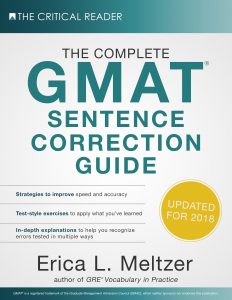Note: this GMAT® Sentence Correction cheat sheet can also be downloaded as a PDF. It is intended to be used in conjunction with the Complete GMAT Sentence Correction Rules, derived from the GMAT Official Guide.
1. Do NOT ignore the non-underlined portion of the sentence; it may include key information.
2. Shorter = Better.
3. –ING, especially BEING, usually = wrong. (Exceptions: idioms and participles used to join clauses). Subjects + conjugated verbs & nouns usually = right.
4. Non-essential clauses are often used to distract from errors and “pad” sentences. Cross out to simplify.
5. Semicolons separate two complete sentences.
6. Singular/plural verb split = subject-verb agreement question. –S = singular verb; no –S = plural verb.
7. It vs. they splits = pronoun agreement. It(s) = singular, paired with singular noun. They/their = plural, paired with plural noun.
8. Collective nouns (jury, agency, company) = singular.
9. This and that should be followed by nouns.
10. All items in a list must be parallel: noun, noun, and noun; verb, verb, and verb; -ING, -ING, and -ING. If items are long, focus on the beginning of each item. Also: remember that constructions on either side of a conjunction or word pair must be parallel.
11. Which often = wrong. This word must refer back to the noun that immediately precedes it.
12. Which = comma; that = no comma.
13. Where = places, not times, books, works of art, etc.
14. Whose = both people and things. Who = people only; which = things only.
15. Due to = caused by, usually wrong.
16. Keep comparisons equivalent: people = people; things = things. Correct comparisons are often introduced by (un)like.
17. Such as = introduce examples; (un)like = introduce comparison.
18. Participial phrase (e.g. having gone, written by) at the start of a sentence often = dangling modifier
19. Make sure modifiers (adjectives, adverbs, prepositional phrases) are placed next to the words they are intended to modify.
20. Top word pairs: not (only)…but (also); both/ between…and; so/such…that; from…to; (n)either…(n)or; just as…so
21. Amount, much, less = singular nouns; number, many, fewer = plural nouns.
